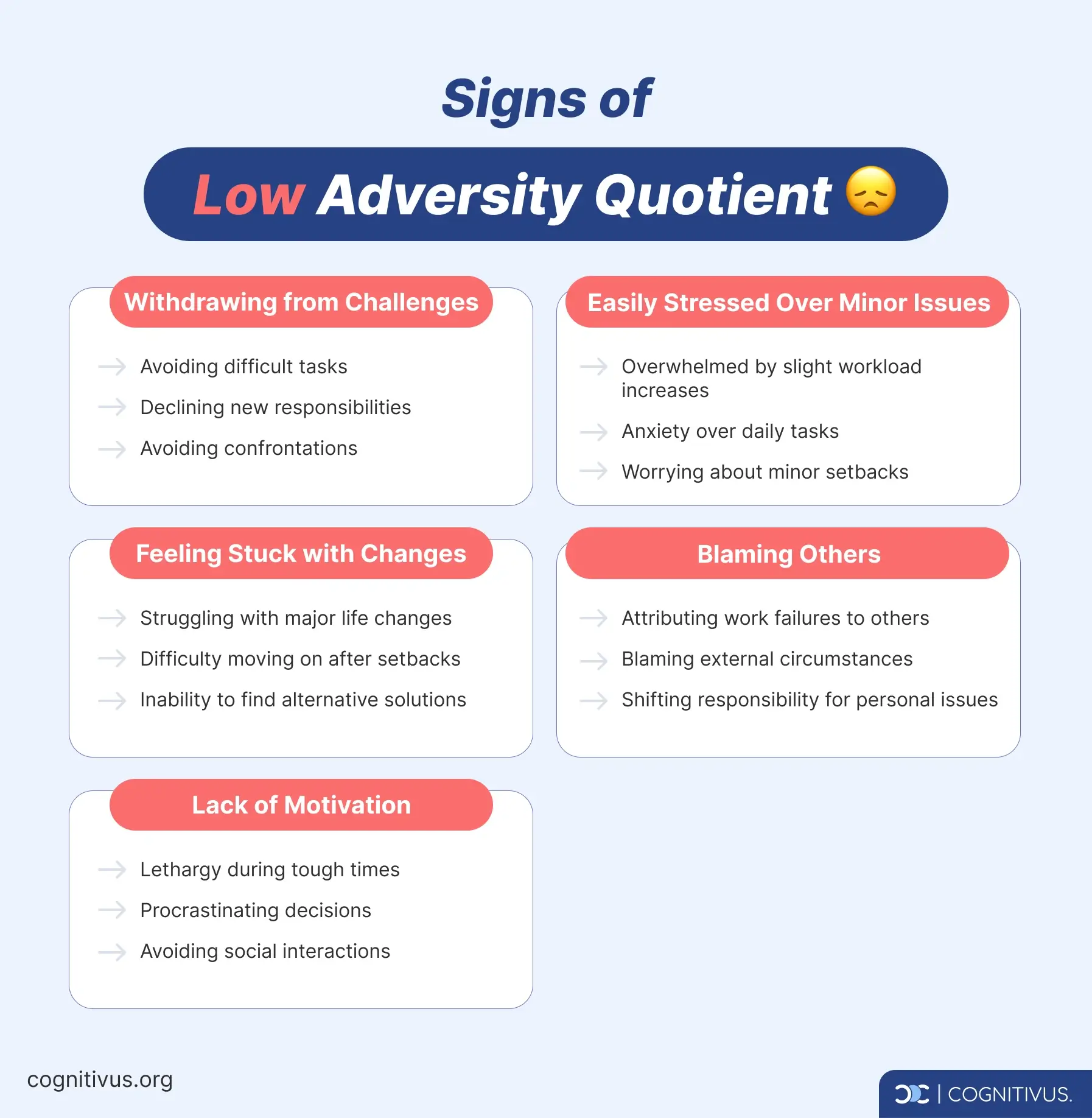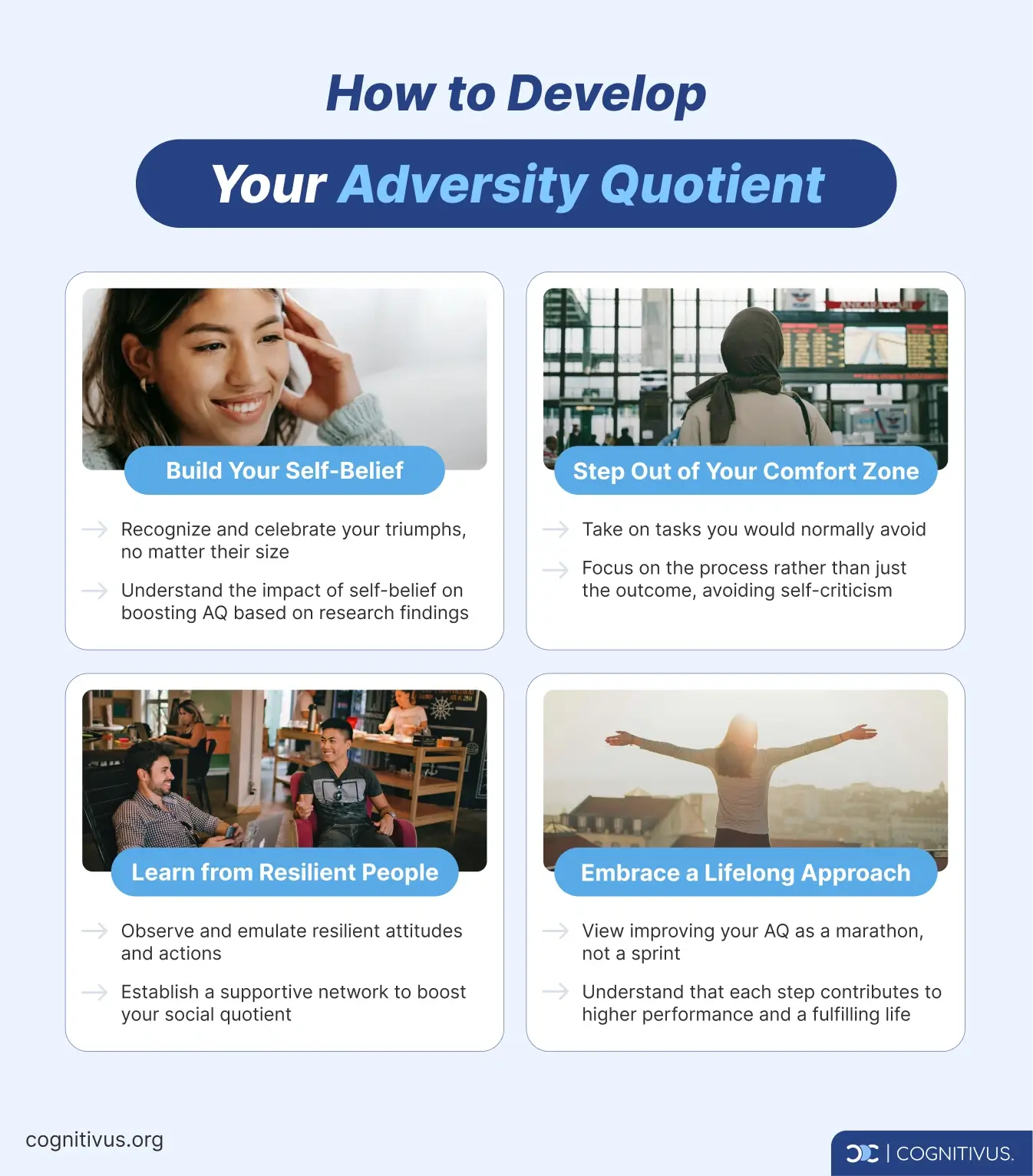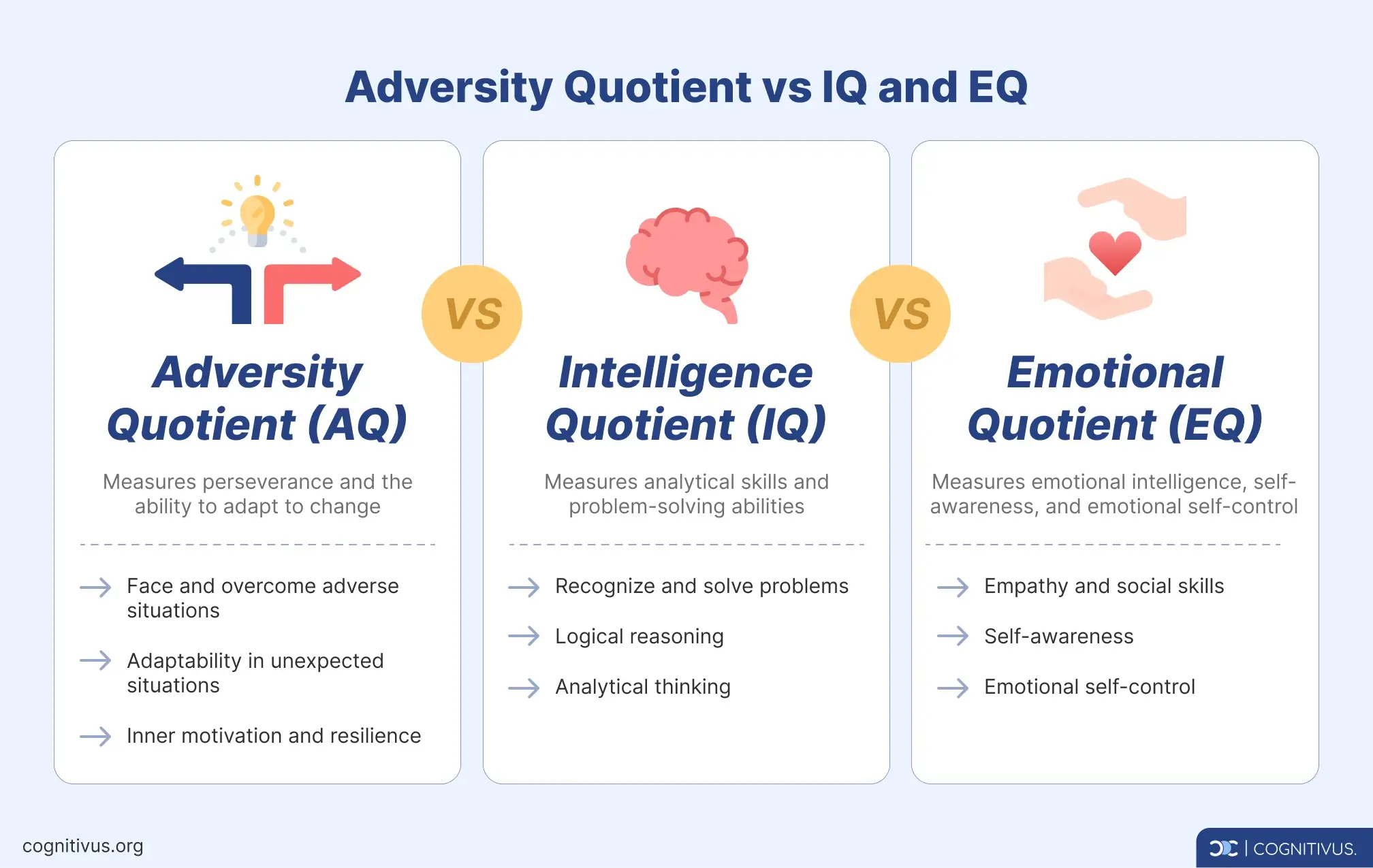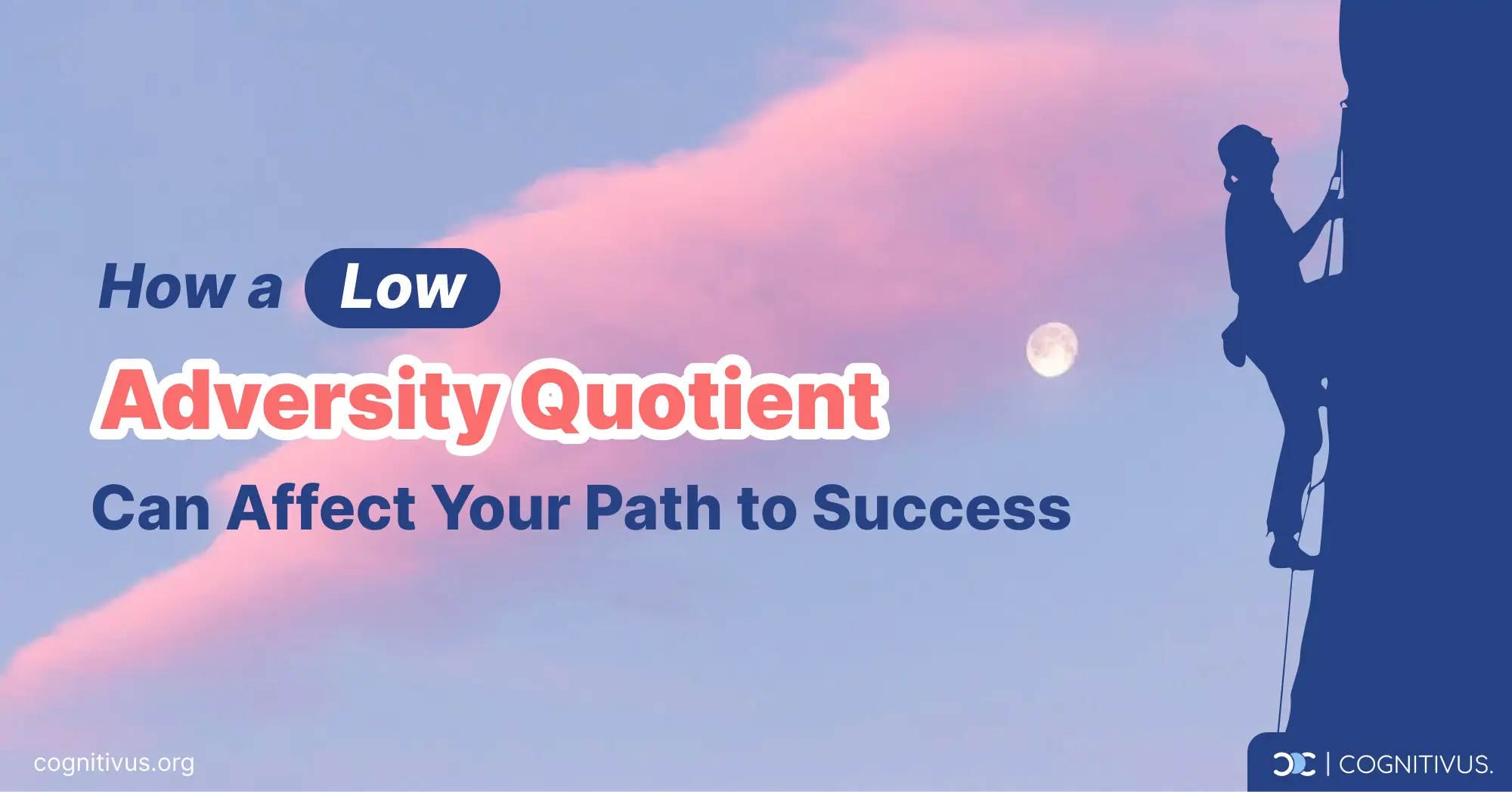When we least expect it, life always throws a curveball our way. Whether it's a flat tire on a busy morning or a major career setback, adversity is a part of life.
Nobody wants to deal with challenges, but when they happen, you need the resilience to pick yourself up and get back on your feet.
How we handle life’s hurdles says a lot about our adversity quotient (AQ), which may be more crucial to our success than general intelligence. Simply put, your AQ is about never giving up and learning to pursue opportunities to help you feel accomplished and fulfilled.
In this guide, we investigate the purpose and benefits of having a strong AQ, along with steps to work on your adversity quotient so you can focus on your path to personal and professional success.
1. What Exactly Is Your Adversity Quotient?
Imagine your AQ as your life's shock absorber, which is like an invisible force that helps you bounce back from challenges. Unlike your intelligence quotient (IQ), which focuses on cognitive abilities, or your emotional intelligence (EQ), which involves your ability to manage emotions, AQ concentrates on resilience. It's about standing up after a fall, learning from the experience, and moving forward with strength and motivation.
AQ involves your response to adversity, your stamina for overcoming problems, and your courage to stand tall despite the odds. It builds perseverance and teaches you to grow when facing change, which are critical skills in personal relationships and your career.
Now that you have a better idea of what our AQ is, let’s compare low and high AQ and why strengthening your adversity quotient matters.
2. The Signs of Low Adversity Quotient
Everyone faces difficulties at certain stages of their lives. But for some, these obstacles seem insurmountable, and they tend to adopt a negative or “give-up” attitude. This is a sure sign of a low adversity quotient (AQ). Fortunately, identifying the signs of low AQ is the first step toward building resilience.
Why don’t we take a closer look at the signs of low AQ?
Indicators of a low AQ
If you’re unsure as to whether you have a low adversity quotient, ask yourself these questions: When you face a setback, do you feel like it’s easier to give up? Do you try to come to terms with change, or do you feel like there’s no way forward?
If your answers lean towards giving up and hopelessness, you need to strengthen your sense of resilience so that you can cope with change and overcome failure.
Let’s explore a few additional signs of low AQ:

Withdrawing from challenging situations:
- Avoiding difficult tasks at work or school because they seem too daunting.
- Declining opportunities for growth or new responsibilities due to fear of failure.
- Preferring not to engage in discussions or activities that could lead to confrontation or conflict.
Getting easily stressed over minor issues:
- Feeling overwhelmed by a slight increase in workload or a small change in routine.
- Experiencing anxiety over daily tasks like commuting or meeting deadlines.
- Reacting with disproportionate worry to minor setbacks, such as a missed appointment or a technical glitch.
Feeling stuck when life takes an unexpected turn:
- Struggling to adapt to changes like a new job, relocation, or significant life events (e.g., marriage, having a child).
- Finding it hard to move forward after a breakup or loss, remaining in a state of emotional paralysis.
- Inability to see alternative solutions or paths when a plan falls through.
Tendency to blame others for misfortunes without taking personal ownership:
- Attributing failure at work to colleagues or management without reflecting on personal performance.
- Blaming external circumstances, like the economy or weather, for personal financial struggles.
- Shifting responsibility to family or friends for personal dissatisfaction or unhappiness.
Lack of motivation when times get tough:
- Feeling lethargic and unmotivated to complete tasks or pursue goals during stressful periods.
- Procrastinating and delaying important decisions or actions because of a lack of energy.
- Avoiding social interactions or hobbies that were once enjoyable leads to increased isolation.
By identifying these patterns, you can develop strategies to enhance your resilience and coping mechanisms over time.
How to measure adversity quotient
You can’t touch or see AQ, so how do you measure this quotient to understand what you need to work on?
The tools we use to measure AQ range from questionnaires to detailed interviews. Because your degree of resilience is not quantitative, such as your IQ, these assessments explore your responses to past situations, including your ability to handle life's challenges.
Typical questions that you can expect on an AQ assessment include:
- How do you react when faced with unexpected challenges?
- Can you describe a time when you had to overcome significant adversity?
- How do you stay motivated during tough times?
- Do you feel in control of your life's direction, or do external factors dictate your actions?
- Who is responsible for your successes and failures?
What your AQ score means
Your responses to the questionnaires and reports are analyzed and scored based on predefined criteria that measure your resilience, motivation, and adaptability.
Your score typically reflects the following abilities:
- Your ability to remain calm under pressure.
- Your persistence in overcoming obstacles.
- Your proactive approach to problem-solving.
- Your sense of control over life events.
- Your accountability for personal outcomes.
I have a low AQ. Now what?
When you have a low AQ, setbacks can feel like permanent stops rather than temporary pauses. I’ve been there, and I understand how the tendency to give up can affect every aspect of your existence. You struggle to move forward because it becomes hard to find solutions to problems that are blocking your path.
Paul Stoltz, a pioneer in quantifying AQ, talks about ways of controlling our responses to adversity. If you have low AQ, it might seem like you have no choice and your life path is obscured, but that could result from reacting rather than taking some time to think about your situation and respond with intention.
You’ve got to understand that adversity is inevitable, but it's how you deal with it that counts.
If you recognize these signs in yourself, take heart. AQ can be developed with effort, patience, and a little guidance. So, roll up your sleeves; it's time to boost that AQ and transform those obstacles into stepping stones!
3. How to Develop Your Adversity Quotient
If you feel like your AQ is subpar, there’s no need to fret. You can grow and improve your adversity quotient, but it does take some effort and consistency.
But where and how do you start?

You can start by building your self-belief. This means recognizing and celebrating your triumphs, no matter their size. In a study concerning AQ, researchers suggest that a strong belief in one's abilities significantly boosts one’s AQ.
Next, practice stepping out of your comfort zone. Pick up a task you would normally avoid and give it a go. Stop criticizing yourself and embrace the process, not just the outcome.
You should also focus on surrounding yourself with people who tend to navigate storms well. This way, you’ll learn how to become more resilient by picking up on their attitudes and actions when difficulties arise. In addition to increasing your AQ, you’ll be working on your social quotient, a measure of your social awareness and savviness. Establishing a supportive and uplifting network of friends and family is crucial to overcoming struggles.
4. The Benefits of a High AQ: Why You Should Embrace Adversity
People with a high AQ are equipped to face problems head-on, see opportunities in challenges, and bounce back with gusto. They embody resilience owing to their self-belief, strong emotional quotient, and motivation to rise above failure.
So why should you embrace adversity?
Embracing life’s trials helps build your resilience muscle, making future obstacles easier to manage. Even under pressure, you’ll find that you can continue to perform at work or control your emotions, helping you make level-headed decisions for your present and future. Resilience can prevent depression and burnout, but it also encourages creativity and innovation.
For instance, a study shows that students with low AQ often struggle to rebound from bullying, which can lead to stress and depression. However, those with higher AQ cope much better, suggesting that building AQ can protect you from trauma and turmoil.
Having a high AQ also helps in the workplace as it creates flexibility, so you find it easier to adapt to evolving job markets. This is reiterated by the BBC, where companies aim to hire individuals with high AQ because their adaptability allows them to thrive in times of change and uncertainty.
Improved AQ can create neurological changes
You might not be aware of this, but working on your AQ can actually create new neural pathways in your brain. Stepping out of your comfort zone and pursuing new opportunities aids positive neurological change, which in turn helps you process your emotions and cope with stress.
5. Adversity Quotient (AQ) Compared to IQ and EQ
Despite IQ and EQ being highly valued abilities, AQ is not to be underestimated. We know that IQ measures your analytical skills, while EQ includes your empathy and social skills, but AQ measures perseverance and the ability to adapt to change.
Employers often use IQ tests to assess employees, but how well do IQ tests predict job performance? Not very well. However, using different quotients creatively can help employers build a dynamic team. Let’s explore exactly what these quotients are:

- Intelligence Quotient (IQ): The ability to recognize and solve problems.
- Emotional Quotient (EQ): Measures emotional intelligence, self-awareness, and emotional self-control.
- Adversity Quotient (AQ): The ability to face and overcome adverse situations.
- Social Quotient (SQ): One’s cultural fit and social awareness.
- Cognitive Quotient (CQ): How one utilizes their intelligence.
Intelligence can open doors, earning you a place in competitive schools and coveted jobs. But what happens when things don't go according to plan? That's where AQ comes in. AQ allows you to pivot gracefully when life takes an unexpected turn.
Take the insights from Natalie Fratto's TED Talk, for instance. She explains that adaptability, which is an integral part of AQ, is essential for success, especially in the fast-paced start-up world. Unlike IQ, AQ isn't about what you already know. It's about how well you can cope with what's coming next.
The reason that AQ is so important for personal and professional success is that it gives you the inner motivation, hopefulness, and no-quit attitude you need to stay on track. In collaboration with IQ and EQ, it makes attaining your goals easier because you know that failure is not the end of the road. Here’s to building your AQ and achieving every success.


